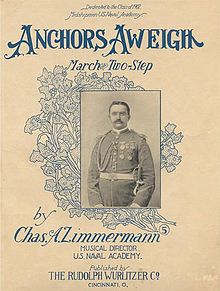Anchors Aweigh: Difference between revisions
Tags: Mobile edit Mobile app edit |
→Lyrics: Correct MCPON Hagan spelling and adding wikilink to MCPON and John Hagan (USN) |
||
| Line 51: | Line 51: | ||
Faith, Courage, Service true, with Honor, Over Honor, Over All. |
Faith, Courage, Service true, with Honor, Over Honor, Over All. |
||
'''Revised Lyrics of 1997 by MCPON John |
'''Revised Lyrics of 1997 by [[MCPON]] [[John Hagan (USN)|John Hagan, USN (Ret)]] which is used today:''' |
||
Stand Navy out to sea, fight our battle cry!<br /> |
Stand Navy out to sea, fight our battle cry!<br /> |
||
Revision as of 21:27, 10 October 2015
| Anchors Aweigh | |
|---|---|
| by Charles A. Zimmermann | |
 |
"Anchors Aweigh" is the fight song of the United States Naval Academy, and as a result, the song is strongly associated with the United States Navy. It was composed in 1906 by Charles A. Zimmermann with lyrics by Alfred Hart Miles. When he composed "Anchors Aweigh," Zimmermann was a Lieutenant, and had been bandmaster of the United States Naval Academy Band since 1887. Miles was Midshipman First Class at the Academy, in the class of 1907, and asked Zimmermann to assist him in composing a song for that class, to be used as a football march. Another Academy Midshipman, Royal Lovell (class of 1926) later wrote what would be adopted into the song as its third verse.
Etymology
To "weigh anchor" is to bring it aboard a vessel in preparation for departure. The phrase "anchor's aweigh" is a report that the anchor is clear of the sea bottom and, therefore, the ship is officially underway.
"Anchors Aweigh" is often misspelled as "Anchors Away," leading to confusion of the terms and the misunderstanding that it means 'to drop anchor' (i.e. 'away'). But that is the opposite of what it really means.
"Weigh" as a verb means to "bear" or "move", thus giving it several shades of meaning and derivation, including "weight" or heaviness. This lends itself to obvious plays on words, as with Flip Wilson's old routine about Christopher Columbus. "Columbus cried, 'Weigh anchor'. A few minutes later, a crewman reported, 'Two thousand, one hundred thirty six pounds'."
History
The song was first played during the Army–Navy football game on December 1, 1906, at Franklin Field in Philadelphia, Pennsylvania. Before a crowd in excess of 30,000 Navy won the game 10–0, their first win in the match up since 1900.
The song was gradually adopted as the song of the U.S. Navy; although there is a pending proposal to make it the official song, and to incorporate protocol into Navy regulations for its performance, its status remains unofficial. Its lyrics were considered too specific to the Academy and not representative of the Navy at large, and so were rewritten by George D. Lottman (note the reference to "farewell to college joys"). Its melody was also slightly rewritten by Domenico Savino.
The song has a joyful, brisk melody, and it has been adopted by several other navies around the world, such as the Finnish Navy.
Lyrics
Anchors Aweigh (1906 version)
Taken from the Naval History & Heritage Command website
Stand Navy down the field, sail set to the sky;
We'll never change our course, So Army you steer shy-y-y-y.
Roll up the score Navy, anchors aweigh!
Sail Navy down the field and sink the army, sink the army grey!
Get underway, Navy, Decks cleared for the fray;
We'll hoist true Navy Blue, So Army down your Grey-y-y-y;
Full speed ahead, Navy; Army heave to;
Furl Black and Grey and Gold, And hoist the Navy, hoist the Navy Blue!
Blue of the Mighty Deep; Gold of God's Sun
Let these colors be till all of time be done, done, done,
On seven seas we learn Navy's stern call:
Faith, Courage, Service true, with Honor, Over Honor, Over All.
Revised Lyrics of 1997 by MCPON John Hagan, USN (Ret) which is used today:
Stand Navy out to sea, fight our battle cry!
We'll never change our course so vicious foes steer shy-y-y-y!
Roll out the TNT, anchors aweigh!
Sail on to victory, and sink their bones to Davy Jones, hooray!
Anchors Aweigh, my boys, Anchors Aweigh!
Farewell to Foreign Shores, we sail at break of day-ay-ay-ay;
Through our last night ashore, drink to the foam,
Until we meet once more, here's wishing you a happy voyage home!
Blue of the mighty deep, Gold of God's great sun;
Let these our colors be, Till All of time be done-n-n-ne;
On seven seas we learn, Navy's stern call:
Faith, courage, service true, With honor over, honor over all.
Media
Template:Multi-listen start Template:Multi-listen item
In popular culture
- In an episode of Garfield and Friends, Garfield sings "Anchors Aweigh" in anticipation of going on a cruise ship with lots of food (after originally refusing to go until hearing about the food).
- "Anchors Aweigh" is featured in the 1945 MGM musical Anchors Aweigh, performed by the U.S. Navy Band.
- It is frequently quoted in Warner Bros. Cartoons to indicate nautical themes.
- A short instrumental clip of "Anchors Aweigh" is featured in the "Baby June And Her News Boys" number in the stage musical Gypsy.
- A band plays "Anchors Aweigh" in Batman during the film's "bomb scene".
See also
References
Further reading
- Collins, Ace. Songs Sung, Red, White, and Blue: The Stories Behind America's Best-Loved Patriotic Songs. HarperResource, 2003. ISBN 0060513047
External links
- "Anchors Aweigh" (mp3 file; part II of medley)
- "Anchors Aweigh" done as instrumental band march (.wav file)
- free-scores.com

